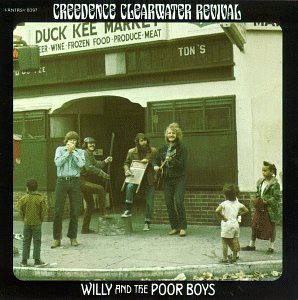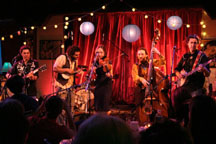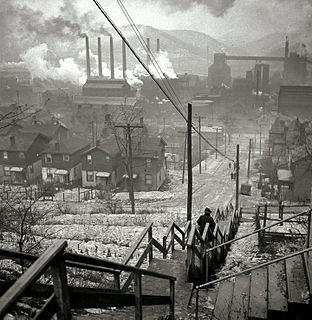
Peter Seeger was an American folk singer and social activist. A fixture on nationwide radio in the 1940s, Seeger also had a string of hit records during the early 1950s as a member of the Weavers, notably their recording of Lead Belly's "Goodnight, Irene", which topped the charts for 13 weeks in 1950. Members of the Weavers were blacklisted during the McCarthy Era. In the 1960s, Seeger re-emerged on the public scene as a prominent singer of protest music in support of international disarmament, civil rights, counterculture, workers' rights, and environmental causes.

Willy and the Poor Boys is the fourth studio album by American rock band Creedence Clearwater Revival, released by Fantasy Records in November 1969. It was the last of three studio albums the band released that year, arriving just three months after Green River.
"A Hard Rain's a-Gonna Fall" is a song written by Bob Dylan in the summer of 1962 and recorded later that year for his second album, The Freewheelin' Bob Dylan (1963). Its lyrical structure is modeled after the question and answer form of traditional ballads such as "Lord Randall".

The Hudson River Sloop Clearwater, Inc. is a non-profit organization based in Beacon, New York that seeks to protect the Hudson River and surrounding wetlands and waterways through advocacy and public education. Founded by folk singer Pete Seeger with his wife Toshi Seeger in 1966, the organization is known for its sailing vessel, the sloop Clearwater, and for its annual music and environmental festival, the Great Hudson River Revival.

The Clearwater Festival is a music and environmental summer festival and America's oldest and largest annual festival of its kind. This unique event has hosted over 15,000 people on a weekend in June for more than three decades. All proceeds benefit Hudson River Sloop Clearwater, Inc., a 501(c)(3) nonprofit environmental organization.
"Turn! Turn! Turn!", or "Turn! Turn! Turn! ", is a song written by Pete Seeger in the late 1950s and first recorded in 1959. The lyrics – except for the title, which is repeated throughout the song, and the final two lines – consist of the first eight verses of the third chapter of the biblical Book of Ecclesiastes. The song was originally released in 1962 as "To Everything There Is a Season" on folk group the Limeliters' album Folk Matinee, and then some months later on Seeger's own The Bitter and the Sweet.

The Mammals are a contemporary folk rock band based in the Hudson Valley area of New York, in the United States.
Len Hunt Chandler, Jr., better known as Len Chandler, is a folk musician from Akron, Ohio.
Precious Friend is a record by Arlo Guthrie and Pete Seeger with Shenandoah and a Warner Bros. recording.

"Where Have All the Flowers Gone?" is a modern folk-style song. Inspired lyrically by the traditional Cossack folk song "Koloda-Duda", Pete Seeger borrowed an Irish melody and the first three verses in 1955 and published it in Sing Out! magazine. Additional verses were added in May 1960 by Joe Hickerson, who turned it into a circular song. Its rhetorical "where?" and meditation on death place the song in the ubi sunt tradition. In 2010, the New Statesman listed it as one of the "Top 20 Political Songs".

Thomas Griffin Winslow was a prominent American folk singer and writer, best known as a "disciple" of Reverend Gary Davis and a former member of Pete Seeger's band. He performed with his family as The Winslows and recorded with Al Polito. His career as a performing artist lasted over forty years. He was most notable as the composer of "Hey Looka Yonder ", a folk song that has been the anthem of the Sloop Clearwater.

Environmentalism has been a theme and cultural trend in popular music. Ecomusicologists and music educators are increasingly emphasizing the intersections of music and nature, and the role of music in ecological activism.
Toshi Seeger was an American filmmaker, producer and environmental activist. A filmmaker who specialized in the subject of folk music, Toshi's credits include the 1966 film Afro-American Work Songs in a Texas Prison and the Emmy Award-winning documentary Pete Seeger: The Power of Song, released through PBS in 2007. In 1966, Seeger and her husband, folk-singer Pete Seeger, co-founded the Hudson River Sloop Clearwater, which seeks to protect the Hudson River and surrounding wetlands. Additionally, they co-founded the Clearwater Festival, a major music festival held annually at Croton Point Park in Westchester County, New York.
Jon Bowermaster is an oceans expert, journalist, author, filmmaker, adventurer and six-time grantee of the National Geographic Expeditions Council. One of the Society’s ‘Ocean Heroes,’ his first assignment for National Geographic Magazine was documenting a 3,741 mile crossing of Antarctica by dogsled.
God's Counting on Me, God's Counting on You (Single) is a 2012 single by Pete Seeger featuring Lorre Wyatt & Friends, produced and arranged by Richard Barone and Matthew Billy, and released by Billy Barone Productions. Originally recorded in 2010 aboard the Hudson River Sloop Clearwater, the song was written immediately after that year's massive BP Oil Spill in the Gulf of Mexico. The spill is referenced in the lyrics. It was Seeger's final single release.

"Pittsburgh Town", sometimes titled as "Pittsburgh" or "Pittsburgh is a Great Old Town", is a folk song written by Woody Guthrie and originally recorded by Pete Seeger. The song was written during a Pittsburgh, Pennsylvania stop on an Almanac Singers' tour; both Seeger and Guthrie were members of the band at this time. The song speaks of the labor and environmental problems that the city was facing in 1941, when the song was written. In the time since, environmental legislation has reduced the pollution problem that plagued Pittsburgh; because of this, the song's mentions of pollution in Pittsburgh have been sometimes been replaced with verses extolling the city.

The discography of Pete Seeger, an American folk singer, consists of 52 studio albums, 23 compilation albums, 22 live albums, and 31 singles. Seeger's musical career started in 1940 when he joined The Almanac Singers. He stayed with the group for two years until he was drafted into the Army to fight in the Second World War. After the end of World War II in 1945, Seeger helped found an organization known as People's Songs, along with the influential folk music magazine People's Songs Bulletin. He published several singles and a studio album with the magazine. Seeger would play at People's Songs events, called hootenannies, until the organization folded in 1949. After People's Songs, Seeger and another former member of the Almanacs, Lee Hays, founded the Weavers, who achieved commercial success. In 1952, The Weavers went on hiatus due to the Red Scare; Seeger and Hays both had Communist ties. After the demise of the Weavers, Seeger released a solo album, American Folk Songs for Children, in 1953 on Folkways Records. He continued to release albums on Folkways until he was signed to Capitol in 1961.

Between 1947 and 1977, General Electric polluted the Hudson River by discharging polychlorinated biphenyls (PCBs) causing a range of harmful effects to wildlife and people who eat fish from the river. Other kinds of pollution, including mercury contamination and cities discharging untreated sewage, have also caused problems in the river.
"Bless Me Indeed " is a song by Christian rock band MercyMe. Written by the band and produced by Pete Kipley, it was released as the lead single from the band's 2001 album Almost There. The song was written at the request of the band's record label, who wanted to produce a song based on the popular book The Prayer of Jabez (2000). Although the band did not want to write it at first, they eventually relented and recorded it.
Frances Fink Taylor was a New York music and film critic and a lyricist whose best-known song, "Those Three Are on My Mind" was a lament for the murdered civil rights workers - James Chaney, Andrew Goodman, and Michael Schwerner.










